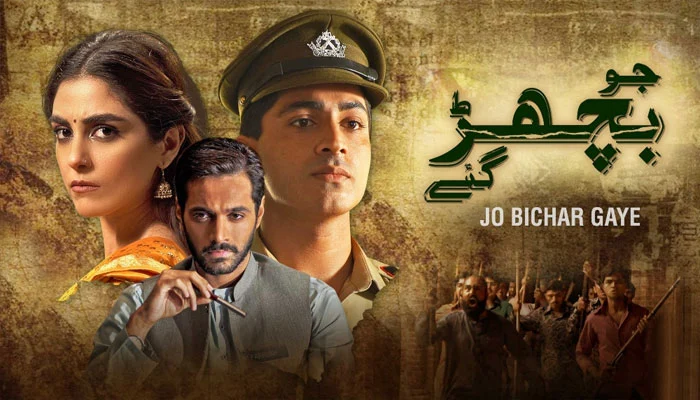In 2010, Haissam Hussain took over our television screens with the compelling, lovable, absolutely gutting “Dastaan.” Cut to over 11 years later, “Jo Bichar Gaye” arrived with high expectations – and exceeded them. While Haissam Hussain has directed several shows in between (including the Aunn Zara, Akbari Asghari, Durr E Shahwar, etc.), this has been his return to a political topic. Starring Wahaj Ali, Maya Ali, Talha Chahour, Adnan Jaffar, Nadia Jamil and many others, “Jo Bichar Gaye” tells the story of the fall of Dhaka through the eyes of Colonel Farrukh, as it is based on his memoirs. The story has been written by Ali Moeen and directed by Haissam Hussain.
With only fourteen episodes, this finale arrived too soon – and yet, as an audience, we are more than enthusiastic to see a return to short, crisp, to-the-point storytelling with a episode count focused on strong content. The story following the events of 1971, ultimately leading to the separation of East and West Pakistan, has kept viewers on their toes from episode one with storytelling that draws in the viewer. As in “Dastaan,” Haissam Hussain masterfully pulls us in, introducing us to the lead characters, allowing us to emotionally connect to them and accept them as our own before tragedy ensues, the horrors of the past coming to life through these beloved characters.
There is a wonderful scene where Rumi gets his revenge for Haroon’s death by poisoning those he once fought with. This is powerful, seeing those once causing terror now at Rumi’s mercy. This entire sequence, from Wahaj Ali’s performance to Usman Zia and Omar Cheema’s face-off as Ajeet and Shil is excellent. In the finale, Rumi (Wahaj Ali) receives his moment of absolution for Haroon’s death when Sonia (Maya Ali) encourages him to save the innocent women waiting to become Shail’s next victims. And while this ultimately leads to Rumi’s death, he dies with hope restored, his guilt eased as he is ignited towards a new mission. We witness Rumi’s death and are left to assume that Sonia has met with the same fate, which is heartbreaking. While many complained of the open-endedness of it, isn’t this exactly what war is? Many are lost without being accounted for as families are simply left to grieve over the unknown. Of course, Talha Chahour’s performance as Farrukh grapples with his turmoil over what’s happening to his beloved country and his fear for Sonia’s life is praise-worthy. The scenes between Farrukh and Colonel Fakhruddin (Adnan Jaffar) are excellent in this episode, driving home the difficult choices the Pakistani army had to make.
There isn’t one single actor to praise in the finale. It’s the final scene that truly makes an impact with Adnan Jaffar standing out as a colonel forced to choose between surrendering or death for his men. The folding of the flag brings out a multitude of emotions. Wahaj Ali has been brilliant as Rumi throughout, speaking volumes through his eyes. Maya Ali has been a picture of grace as Sonia, winning our hearts. While we could predict what their outcome would be, it does not ease the emotional blow in the least. Both Wahaj and Maya outdone themselves. Talha Chahour is a wonderful actor and has emerged as a surprise star. Farrukh has been the eyes and ears of the audience, the story told from his point of view, and it has been his empathy and understanding which has allowed the audience to see both the plight of the Bengalis and the struggle West Pakistanis experienced. This young actor has a bright future ahead. Of course, Nadia Jamil has been pitch perfect in each scene and the entire “fresh” cast has won us over, including (but not limited to) Rana Majid Khan, Fahad Hashmi, Usman Zia, Ahmed Abbas, Umer Dar….the list is endless! Each actor has played his part perfectly.
More than anything, what “Jo Bichar Gaye” has proved is that Pakistani dramas can be held to a standard. Of course, Pakistan produces some high-level dramas each year, but “Jo Bichar Gaye” has taken a concept and turned it into high-voltage, emotion and action driven content with stellar production values, worthy of being on Netflix. In the past year, a few dramas have proved “less is more,” with shorter episodes and fast-paced, well-written, focused stories. Will “Jo Bichar Gaye” be a precedent-setter for the kind of quality content Pakistani teams are capable of and lead the way for more of its kind? Honestly, “Jo Bichar Gaye” has served as a history lesson for many. While the East Pakistan side of events has always been clear, the West Pakistan side has always been a cause for shame, brushed under the rug and rarely spoken of. It has been an emotional journey to watch and experience the other side of events while also keeping the narrative neutral without stripping Bengalis of their legitimate plight. It’s the final scene that grabs hold and strikes deep in the heart, the visual of how India, Pakistan and Bangladesh were tossed into turmoil at the hands of those who rarely stand to lose what average citizens do – the politicians. Thank you to team “Jo Bichar Gaye” for this wonderful gift.
